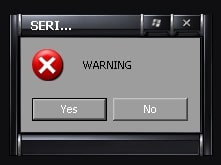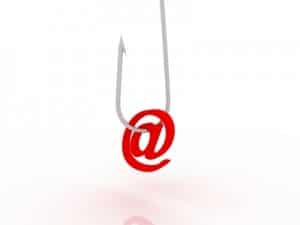Posted by Eric O. Schueler, Senior V.P. of Information Technology

Internet Fraud can destroy your operating system, network and files. Beware of Phishing and Fake Error Messages. Learn not to be a victim.
Beware of Internet Fraud using Phishing and Fake Error Messages
It’s called internet fraud and internet scams. These are internet tactics designed to get personal information, banking information and money. These are no longer just the people using the US mail or going door-to-door. These are intelligent, computer and internet con-artists trying to scam people for money and information.
Internet scams that will continue to remain in the forefront in 2014 include phishing emails and fake error pop-up messages. Let’s explore how to identify these forms of internet fraud and avoid becoming victim to them.
What is Phishing?
Phishing emails and websites are created to steal money and information and compromise computer security. Cybercriminals will send you an email with a link that will either steal your log in information, or send you directly to a virus. Often the email will say it is from an organization you use such as a bank, a social media site, or a popular online shopping site. Whatever you do, don’t click on the link. While the company may be legitimate, the email is not.
How to Identify a Phishing Email
There are a few easy ways to identify a phishing email.

- Often phishing emails appear to come from popular companies.
- They include links. If you hover your mouse over the link (DO NOT click on it) you will see an address that has nothing to do with the company such as a string of numbers.
- They often contain threats or scare tactics, such as if you do not respond your account will be closed. Another type of message you might receive may tell you your account with a company has been compromised. None of these messages are true and they are only trying to compel you to click the link.
- Many have spelling and grammar issues. If something is misspelled in an email, most likely the email is not legitimate and should be discarded.
Fake Error Pop-Up Messages
Another frequently used internet scam, which also employs the use of scare tactics, is pop-ups that warn of a threat to your computer’s security. In addition to fake errors, we’ve seen a lot of fake update messages. Adobe Flash is the biggest issue lately. People think they are updating their Flash, but instead, they are installing Malware.
The pop-up messages usually look legitimate, but there are some things to watch out for:
How to know if warning message is a fake
- Real security warnings on your computer should have the name of your anti-virus software company or firewall protection company at the top of the warning. If it doesn’t have the company name at the top, do not click on it at all.
- Fake error pop-up messages may have odd colors, misspelled words or strangely worded phrases.
- If a warning seems suspicious try typing the words on the warning into a search engine to see if any fake error pop-up scams are flagged.
What to do if you receive a fake error pop-up message
- If you receive a fake error pop-up message on your computer do not click on the message at all. Do not click ok, cancel or even the close box.
- Open up the Task Manager on your computer and click “End Task.” This should safely close the pop-up. If that does not work shut down your computer immediately.
- After the window is gone run a virus scan from your anti-virus software program to make sure Malware has not been installed on your computer.
There are several kinds of internet fraud that will compromise computer security, but there are measures you can take to prevent falling victim. Always have up-to-date anti-virus software and firewalls on your computer, and make sure your computer network is secure. For more information, click here to read my blog, Tips to Maintain Online Security for your Computer.
Federal Bureau of Investigation: Click here for the FBI tips to protect yourself and your family from various forms of Internet fraud.
To make an Internet crime complaint: Click here for the the Internet Crime Complaint Center (IC3). It is a partnership between the Federal Bureau of Investigation (FBI) and the National White Collar Crime Center
The Top 10 Internet/Email Scams for 2014
1. The Nigerian scam, also known as 419
2. Advanced fees paid for a guaranteed loan or credit card
3. Lottery scams
4. Phishing emails and phony web pages
5. Items for sale overpayment scam
6. Employment search overpayment scam
7. Disaster relief scams
8. Travel scams
9. “Make Money Fast” chain emails
10. “Turn Your Computer Into a Money-Making Machine!”
Call today. (757) 399-3350
Hampton Roads Communication Technologies (HRCT) provides IT and computer network services, including information security, network security and virus protection and removal, to companies and organizations throughout the United States, Mid-Atlantic and the Hampton Roads Virginia cities of Virginia Beach, Chesapeake, Norfolk, Portsmouth, Suffolk, Newport News and Hampton, north into Williamsburg and south into the Outer Banks of North Carolina. HRCT keeps your company connected with 24/7 emergency service.
Call today. (757) 399-3350
Posted by Eric O. Schueler, A+, MCP, MCSE, MCTS, CSSA, ACSP – Senior V.P. of Information Technology at HRCT. Eric has been in the business of providing IT and consulting for small and medium business for more than 15 years.
Sources:microsoft.com; blogs.cornell.edu; which.co.uk
Photo courtesy of: FreeDigitalPhotos.net David Castillo Dominici (phishing email)



